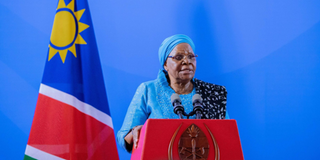Prime
Namibian president exposes struggles of female leaders

What you need to know:
- Challenges for women leaders arise from all segments of society, including men, other women and the broader community, with social media often exacerbating these difficulties
Dar es Salaam. Namibian President Netumbo Nandi-Ndaitwah has underscored the trials and tribulations that women leaders across the globe continue to face, urging them to remain steadfast and dismiss any misinformation directed their way.
Speaking during a special public lecture at the University of Dar es Salaam on May 21, 2025, President Nandi-Ndaitwah warned that discouragement and constant scrutiny are part of the difficult journey that any woman in leadership must be prepared to confront.
She noted that such challenges stem not only from men but also from women and society at large, with social media platforms exacerbating the situation by being used to discredit and derail women in leadership.
“To all women leaders, once you are in a leadership position, you must learn to stand firm on your own. You will face many trials meant to push you off your path,” said President Nandi-Ndaitwah.
She emphasised that these attempts come from all directions—men, women, and the wider community—urging female leaders to focus on their responsibilities with resilience and commitment.
According to her, the digital age has only made matters worse, as social media is often weaponised to tarnish reputations, particularly of women leaders.
“These are all tactics aimed at diverting you from effective leadership. You must be strong,” she told a hall full of young female scholars and leaders. Sharing her own political journey, President Nandi-Ndaitwah recounted how she entered the political sphere as a young girl and persevered despite severe obstacles—including being jailed for three years before she was even 18.
One particular moment she recalled was her court appearance as a teenager, where her lawyer argued that someone under 18 should not be on trial. However, the presiding judge overruled this, citing the nature of the case, leading to her conviction and incarceration.
Following her release, she continued her activism, which eventually saw her seek refuge and political engagement outside her country, including in Tanzania.
While in Tanzania for around six years, she was compelled to learn Kiswahili to better integrate and communicate. “I was told by then Foreign Affairs minister, Dr Salim Ahmed Salim, that if I couldn’t speak Kiswahili within six months, I’d have to return home. I asked Kate Kamba to teach me, and eventually, I became fluent,” she said.
President Nandi-Ndaitwah attributed her success to her determination and refusal to abandon her goals, which propelled her through various leadership positions and ultimately to the presidency.
“If you are determined and know what you want to do, you will achieve it. As women, we should never allow ourselves to be derailed—not until the day we depart from this world,” she added. She cautioned female leaders to ignore malicious rumours and online attacks, instead focusing on their ambitions.
“In this era of digital communication, false and damaging narratives will be spread about you online. Learn to ignore them,” she stressed.
President Nandi-Ndaitwah tied her remarks to the global women’s empowerment movement that gained traction during the 1995 Beijing Conference, which birthed key resolutions on gender equality.
“Your destiny is defined by how you lead yourself and others,” she remarked. She also highlighted that today’s youth are better placed to lead because they have access to quality education, unlike previous generations who were subjected to inferior colonial systems.
“You’re lucky. You’re not like us who received substandard ‘Bantu education’,” she told the students.
She further stated that women are equally capable of leading their countries, the continent, and the world at large—urging for more opportunities to be opened for them.
Interestingly, the Namibian president observed a growing challenge: as focus increasingly shifts to empowering women, boys are being left behind. “In Namibia, we don’t have a First Lady who champions women’s causes—we have a First Gentleman, and he’s now focusing on helping young boys, because they’ve been left behind,” she said.
She shared that while she recently travelled to Angola, her husband stayed back to lead a programme teaching boys how to become responsible men.
Also present at the lecture, Tanzania’s Minister of Education, Science and Technology, Professor Adolf Mkenda, highlighted the country’s legacy in supporting liberation movements across the continent, including Namibia’s.
He said Tanzania was proud to have played a key role in establishing the University of Namibia, with a Tanzanian academic overseeing its founding. Prof Mkenda also commended Namibia for embracing Kiswahili as one of its teaching languages. “We’ve begun efforts to ensure gender equity across all levels of education, including higher learning. We offer scholarships with gender balance in mind,” he said.
He reaffirmed the government’s commitment to ensuring education contributes to national economic transformation. Prof Mkenda also praised President Nandi-Ndaitwah for her sacrifices during the liberation struggle and her continued commitment to Africa’s progress.
Describing her as a trailblazer, University of Dar es Salaam’s Deputy Vice Chancellor for Planning, Finance and Administration, Prof Bernadetha Kilian, said President Nandi-Ndaitwah is one of only 28 women globally to have ever led a nation.
“She has an inspiring story that educates all Africans. She was raised in a family that valued education, even under colonial rule,” said Prof Kilian.






